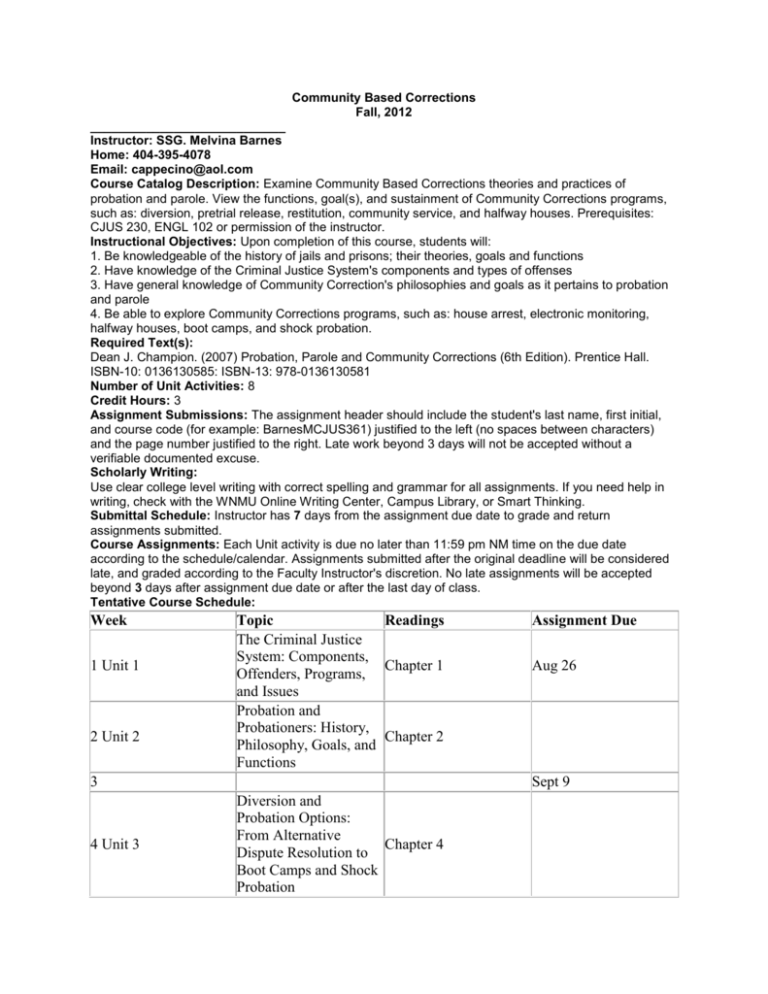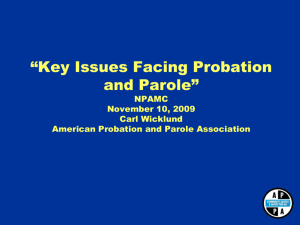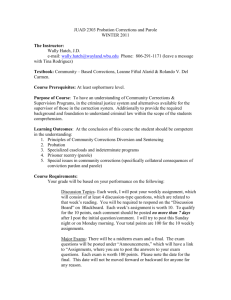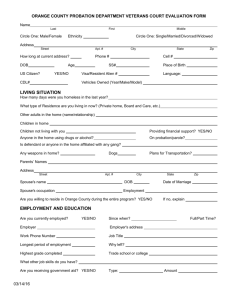CJUS 361 CRN 10134
advertisement

Community Based Corrections Fall, 2012 ____________________________ Instructor: SSG. Melvina Barnes Home: 404-395-4078 Email: cappecino@aol.com Course Catalog Description: Examine Community Based Corrections theories and practices of probation and parole. View the functions, goal(s), and sustainment of Community Corrections programs, such as: diversion, pretrial release, restitution, community service, and halfway houses. Prerequisites: CJUS 230, ENGL 102 or permission of the instructor. Instructional Objectives: Upon completion of this course, students will: 1. Be knowledgeable of the history of jails and prisons; their theories, goals and functions 2. Have knowledge of the Criminal Justice System's components and types of offenses 3. Have general knowledge of Community Correction's philosophies and goals as it pertains to probation and parole 4. Be able to explore Community Corrections programs, such as: house arrest, electronic monitoring, halfway houses, boot camps, and shock probation. Required Text(s): Dean J. Champion. (2007) Probation, Parole and Community Corrections (6th Edition). Prentice Hall. ISBN-10: 0136130585: ISBN-13: 978-0136130581 Number of Unit Activities: 8 Credit Hours: 3 Assignment Submissions: The assignment header should include the student's last name, first initial, and course code (for example: BarnesMCJUS361) justified to the left (no spaces between characters) and the page number justified to the right. Late work beyond 3 days will not be accepted without a verifiable documented excuse. Scholarly Writing: Use clear college level writing with correct spelling and grammar for all assignments. If you need help in writing, check with the WNMU Online Writing Center, Campus Library, or Smart Thinking. Submittal Schedule: Instructor has 7 days from the assignment due date to grade and return assignments submitted. Course Assignments: Each Unit activity is due no later than 11:59 pm NM time on the due date according to the schedule/calendar. Assignments submitted after the original deadline will be considered late, and graded according to the Faculty Instructor's discretion. No late assignments will be accepted beyond 3 days after assignment due date or after the last day of class. Tentative Course Schedule: Week 1 Unit 1 2 Unit 2 Topic Readings The Criminal Justice System: Components, Chapter 1 Offenders, Programs, and Issues Probation and Probationers: History, Chapter 2 Philosophy, Goals, and Functions 3 4 Unit 3 Assignment Due Aug 26 Sept 9 Diversion and Probation Options: From Alternative Chapter 4 Dispute Resolution to Boot Camps and Shock Probation 5 6 Unit 4 7 8 Unit 5 Sept 23 The Presentence Investigation Report: Background, Chapters 3 and 7 Preparation, and Functions Judges and Parole Boards: Probation and Parole Revocation Actions Jails and Prisons: Inmate Profiles and Chapter 5 Contemporary Issues 9 10 Unit 6 11 12 Unit 7 13 14 Unit 8 15 Oct 7 Oct 21 An Overview of Community Chapters 8 and 9 Corrections: Types, Goals, and Functions Home Confinement and Electronic Monitoring Work or Study Release Chapters 10 and 11 and Furlough Programs Halfway Houses and Community Residential Centers Probation and Parole Officer Training, Retention, and Chapters 12 and 14 Caseloads: Rewards and Hazards of PO Work Supervising Women and Special Needs Offenders: OfficerClient Interactions Nov 4 Nov 18 Dec 2 Academic Integrity: All work submitted in this course must be the student's own. This includes all assignments, exams, term papers, and any other projects required. The submission of another person's work represented as that of the student's without properly citing the source of the work will be considered plagiarism and will result in an unsatisfactory grade for the work or result in academic dismissal. Course Assessment/Course Grade: Students are expected to complete all performance requirements for the course and to demonstrate knowledge of the course’s concepts and course objectives. This may require students to use library resources and document research with citations, bibliographies, and references as applicable in completing their coursework. The American Psychological Association (APA) format, 6th Ed. will be required for all paper assignments. Helpful sources: http://www.apastyle.org/ and http://flash1r.apa.org/apastyle/basics/index.htm. Use clear college level writing with correct spelling and grammar for all assignments. If you need help in writing, check with the WNMU Online Writing Center. It is strongly recommended that you do not use Wikipedia for an academic resource. Grading Scale: for Undergraduates Undergrad Scoring Numerical Points 90-100 80-89 70-79 60-69 50-59 Letter Grades A B C D F Attendance: Attendance in an online class is evaluated by your attendance to the material. You will need to be a “self-starter” and control your own calendar in order to meet the deadlines for the course. Class attendance will be taken weekly. It is the obligation of the student to partake in unit discussions. There must be (3 – 5) discussion entries per unit. Merely stating, “Good job”, “Great Entry”, or “Discussion was Informative” will take away from your participation grade. Before submitting discussions or responses, please proofread all work for grammar and spelling. You will need to be a “self-starter” and control your own calendar in order to meet the deadlines for the course. All discussion responses cannot be posted on the same day. Conduct: Students and the instructor share a responsibility for maintaining an appropriate, orderly, and adult learning environment on-line. Students who fail to adhere to the behavioral expectations of the instructor may be subject to disciplinary actions by the school. Professionalism: Students are learning professional skills and are expected to engage in classroom discussions, complete reading assignments, and turn in assignments in a timely fashion as befitting professional behavior. Informed Consent: Some individuals may choose to disclose personal information during class. Therefore, it is important that all classmates agree not to discuss or write about what others have discussed in class. Expectations: 1. 2. 3. 4. Read all material assigned for each chapter, including modules. Read lecture notes, since they are testable items. Quizzes will consist of lecture notes and questions from the chapters. Every reasonable accommodation will be made to assist any student with special needs to meet the academic requirements expected of all students enrolled in the course. 5. Do not expect to be graded on a curve. 6. Ensure your research paper stay on task. Study Tips: Read each chapter and study daily to engross amounts of information. Underline or highlight key definitions, special terms, and names. Use your notes as a reference resource. Do not memorize. Try and relax when taking quizzes to reduce anxiety. Need Help: If the Canvas system goes down or you have other technical questions, contact the WNMU Help Desk: helpdesk@wnmu.edu or (575) 574-4357. Go to the Canvas Student Resources page: http://www.wnmu.edu/VirtualCampus/HowtoGetIntoYourOnlineClass.shtml






